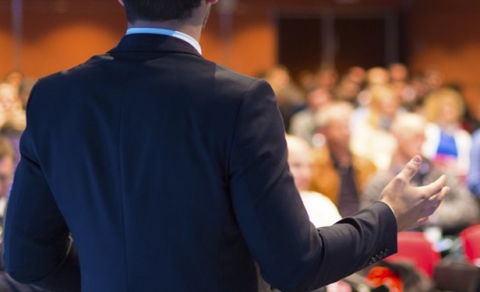Speakers’ Promotion Plays Large Role in Event Promotion

A strong roster of expert speakers leading sessions is critical in an event’s appeal to attendees. In addition to events promoting their speaker lineup, speakers promoting the events they participate in can help push attendance growth.
While not all show organizers are utilizing this grassroots effort, many have found it to be a critical tool and likewise, many speakers are eager to contribute to an event’s success.
“Because of the ease of use in posting to social media and even creating videos (after all, how hard is it to stick your face in front of your computer’s webcam, hit ‘record’ and send the finished product to the planner?), event planners should tell speakers to help promote their events rather than simply ask them,” said Greg Schwem, professional speaker with Comedy with a Byte.
However, according to Davis Ridley, marketing and public relations manager at Encore Live, his company tends to refrain from asking speakers to promote their sessions at events.
“We want to respect their time and commitments,” Ridley said. “However, oftentimes speakers will promote their sessions on their own, particularly on social media. This helps generate buzz and word of mouth about the event.”
Speakers’ promotion can be essential in the success of new events, as was the case for the launch of the Midwest Weddings Summit.
“We brought in national speakers…in an attempt to attract more attendees, have worthwhile content and use their networks to promote the event, seeing as that we came out of nowhere,” explained J. Belmont, director of marketing and communications for Midwest Wedding Summit.
Many speakers and show organizers advocate for creating short, personal videos that promote the speaker’s appearances.
“I speak at the SEME convention with more than 50,000 attendees,” said Patti Wood, a professional speaker at Communications Dynamics.
She continued, “I write an article for them on my topics, I send a press kit and I do two videotaped interviews onsite at their YouTube station during and after the event. They give me the copies as well so I can post the videos on my YouTube station.”
According to Schwem, the purpose of his pre-event video is twofold: to get people excited about his appearance and encourage attendees to register for the event.
But whether speakers are using video or other preferred means of communication such as email or social media, helping them craft the message is important to ensure consistency and convey the event’s value. It also makes it easier for speakers to act.
“Create a media kit for speakers that includes social media graphics and copy designed to convert,” suggested Natalie Franke, head of community and co-founder of the Rising Tide Society, which organizes the Rise Summit, an annual event that draws more than 8,000 attendees.
She continued, “If you can remove as much friction as possible, speakers are more likely to share information about your event with their audience. Set yourself up for a retweet by tagging speakers in the image when promoting your event. Image tags stand out when they are reviewing their notifications and are more likely to be re-posted.”
The organizers of the Midwest Wedding Summit also helped its speakers craft messages to their personal audiences.
“All of our speakers had their own followings and encouraging them to use their channels was not hard at all,” Belmont explained. “All we had to do was provide the necessary information and the angle.”
Speakers and show organizers who have used this type of grassroots promotion see it as an essential part of their marketing promotion and believe social media makes it an easy tactic to execute.
“I think it is absolutely required to ask your speakers to help promote your event in some way, especially in a social media context,” Belmont added. “This was one of the critical factors in making our event a success.”
Franke also advised show organizers to ensure that expectations around promotion are clear from the beginning.
“Any requirements for promotion should be outlined in the signed speaker agreement,” said Franke.
Bottom line, speakers can help advance an event’s attendance promotion and most of the time they’re not shy about doing it.
“I often wonder why event planners don't utilize their speaker's promotional services more,” Schwem said. “After all, we are great promoters. It's probably how we got the gig in the first place!”


Add new comment